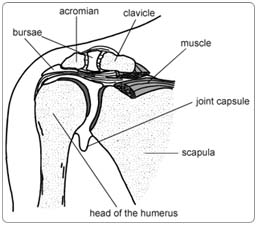What is it?
A tendon is a strong cord which joins a muscle to a bone. It enables the bone to move when the muscle contracts. The rotator (row-tay-tor) cuff is the group of tendons over the top of the shoulder joint that make your arm move. One of your tendons is torn. This is probably as a result of the tendon rubbing against the bone above. Having a torn rotator cuff gives you pain when you use your arm. You may not be able to do certain things, such as lift your arm above shoulder height.
The Operation
 You will have a general anaesthetic, and will be asleep for the whole operation. A cut is made over the front of the shoulder in the line of a bra-strap. Some of the overlying bone is removed.
You will have a general anaesthetic, and will be asleep for the whole operation. A cut is made over the front of the shoulder in the line of a bra-strap. Some of the overlying bone is removed.
This gives more room for the tendons. The tear in the tendons is repaired with stitches. The skin wound is then closed with stitches. There may be a fine plastic drainage tube running from the wound.
This is to drain any residual blood from the operation. You will be in hospital one or two nights after the operation.
Any Alternatives
Without an operation, both the pain and weakness will persist. Sometimes the overlying bone is removed, but the cuff is not repaired. This improves the pain, but the weakness remains. In your case, the best plan is to try and repair the torn tendon as well as remove the bony overhang.
Before the operation
Stop smoking and get your weight down if you are overweight. (See Healthy Living). If you know that you have problems with your blood pressure, your heart, or your lungs, ask your family doctor to check that these are under control. Check the hospital's advice about taking the Pill or hormone replacement therapy (HRT). Check you have a relative or friend who can come with you to the hospital, take you home, and look after you for the first week after the operation. Bring all your tablets and medicines with you to hospital. On the ward, you may be checked for past illnesses and may have special tests, to make sure that you are well prepared and that you can have the operation as safely as possible. . Many hospitals now run special preadmission clinics, where you visit for an hour or two, a few weeks or so before the operation for these checks.
After - In Hospital
Your arm will be in a sling that also has a waist strap. This is to stop you moving your shoulder - which would hurt. The wound may be painful. You will be given injections or tablets to control this. Ask for more if the pain gets worse. A general anaesthetic will make you slow, clumsy and forgetful for about 24 hours. The nurses will help you with everything you need until you are able to do things for yourself. Do not make important decisions during this time. The wound will have a simple adhesive dressing over it. Your wound drain will be removed after 24 to 48hours.. Your stitches will be taken out 10 to 12 days after the operation. The physiotherapist will advise you and teach you the exercises that you are permitted to do at this stage. You may remove your sling to wash. Wash around the dressing for the first 10 days. You can wash the wound area as soon as the dressing has been removed. Soap and warm tap water are entirely adequate. Salted water is not necessary. You can shower or take a bath as often as you like. You will be given an appointment to visit the orthopaedic outpatient department about one month after you leave hospital. The nurses will advise about sick notes, certificates etc.
After - At Home
You cannot drive whilst your arm is in a sling. You will not have free movement of your arm for several weeks after the sling has been removed. Physiotherapy will be arranged for you. Therefore you will not be able to drive for about three months. How soon you can return to work depends on your job. If you can work one handed, you may be able to return to work about two weeks after the operation. This also depends on you being able to get to work. You will be able to perform light work after about three months. If you perform heavy manual work, you will be off work for 6 to 12 months. You can start to swim and play non-contact sports about three months after your operation. You must not play contact sports for at least six months. When you re-start sport, you will not be able to play for as long as normal. Your shoulder will ache and be stiff at the end of a game. Your shoulder may continue to improve for up to 18 months.
Possible Complications
As with any operation under general anaesthetic there is a very small risk of complications related to your heart or your lungs. The tests that you will have before the operation will make sure that you can have the operation in the safest possible way and will bring the risk for such complications very close to zero.
Wound infection sometimes occurs. You will be given antibiotics to prevent this. Very rarely, more serious complications can occur, such as further damage to the joint or damage to the nerves or blood vessels in or around the area of the operation and you might need another operation to deal with the problem.
Although this operation is successful most of the time, it is not always possible to repair a large tear. If this is the case, the overhanging bone is still removed. This will relieve the pain. The repaired tendons may come apart again. The shoulder may stiffen slightly.
Advanced Reproductive Technology
- In Vitro Fertilisation (IVF)
- Intracytoplasmic Sperm Injection (ICSI)
- Donor egg and embryo programs
- In Vitro Fertilisation (IVF)
- Pre-implantation genetic diagnosis (PGD)
- Surrogacy programs
Dental Videos





